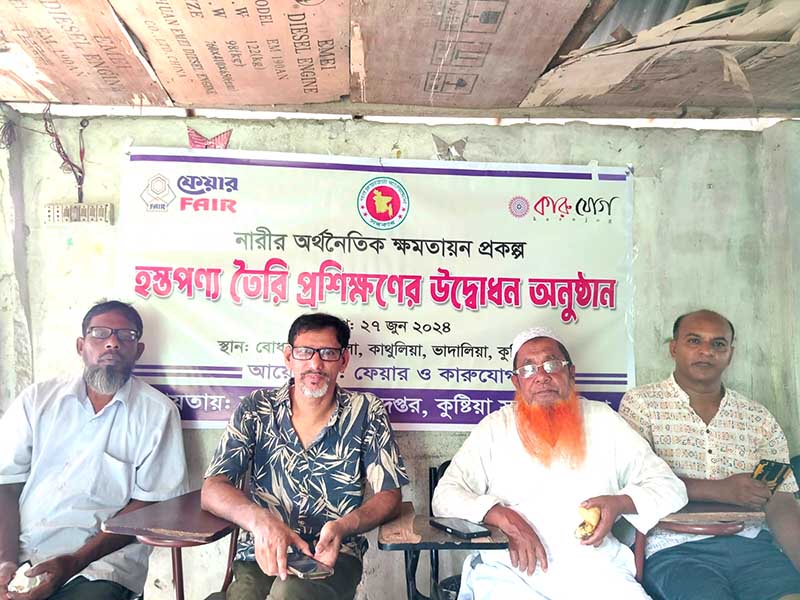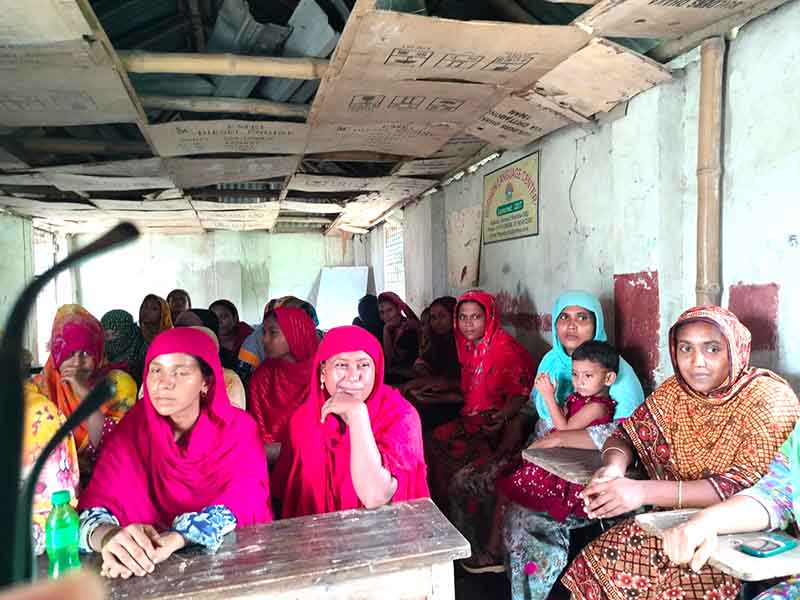Women’s Empowerment Through Handicraft Training | 4-Month Course by FAIR

Women’s Empowerment Through Handicraft Training: A 4-Month Course for Marginalized Women in Kushtia
Women’s empowerment through handicraft training is a key focus of FAIR’s ongoing efforts to uplift marginalized women in Kushtia. Since 2017, FAIR has been actively working to promote women’s economic empowerment, and the Handicraft Training Program is part of their continuous efforts under the FAIR’s Empowering Marginalized Women Program. This specific training initiative, conducted in collaboration with the Directorate of Youth Development, Kushtia, is aimed at providing 30 women with essential skills in jute products and handicrafts. The program was inaugurated on June 27, 2024, at Bodhan Pathashala in Vadalia Union, Kushtia Sadar Upazila.
The inaugural ceremony was presided over by Anwar Hossain Mondal, President of Bodhan Pathashala, and was attended by Dewan Akhtaruzzaman, Director of FAIR, and Masudur Rahman Sakati, a local social activist, as guests of honor.
Empowering Women for Economic Development
Saidur Rahman, an international NGO worker and founder of Bodhan Pathashala, emphasized the importance of providing women with the opportunity to gain skills in various handicrafts as a means of becoming self-reliant. He expressed his gratitude to FAIR and Karujog for initiating the program, sharing his belief that this training would empower women to improve their skills and contribute meaningfully to their families’ financial growth.
FAIR’s Commitment to Women’s Economic Empowerment
Since its inception in 2017, FAIR has been dedicated to enhancing women’s economic empowerment, particularly for marginalized communities. Dewan Akhtaruzzaman, Director of FAIR, highlighted that the organization’s focus on women’s development aims to prevent abuse and create opportunities for economic participation. He emphasized that today’s training is just one of many initiatives designed to empower women and encourage their active involvement in the economy.
Creating Opportunities for Growth
Anwar Hossain Mondal, President of the event, spoke about the untapped potential of women and the critical role that FAIR and Karujog play in providing the right environment and opportunities. He encouraged the trainees to approach this program with commitment, ensuring that their new skills would bring economic stability to their families.

Program Support and Execution
The 4-month course is designed to equip 30 women with practical skills in jute products and handicrafts, creating economic opportunities for them. Rumana Khatun, Supervisor at Karujog, and Robin Kumar, Project Officer of FAIR, provided support and ensured the smooth execution of the event and training program.
Conclusion: Building a Sustainable Future for Women
The women’s empowerment through handicraft training program is more than just about acquiring a new skill; it is about giving marginalized women the opportunity to transform their lives. Through handicraft skills, these women can help uplift their families economically, paving the way for a brighter, self-reliant future. FAIR’s Empowering Marginalized Women Program continues to serve as a model for community empowerment, where skills and economic independence go hand-in-hand.
